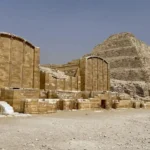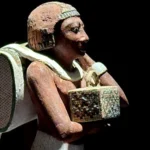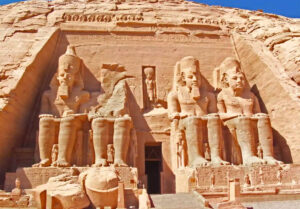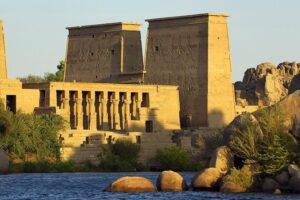Legacy of the Pharaohs
The legacy of the pharaohs is immense and enduring. It’s a testament to a civilization that pioneered monumental architecture, advanced governance, and a profound cultural identity. The influence of these divine rulers extends far beyond the sands of Egypt, shaping everything from modern architecture to popular culture.
The Pharaoh: More Than Just a Ruler
The pharaoh was the central figure of ancient Egypt. They were not just a king or queen; they were considered a living god, the embodiment of the god Horus. This divine status gave them absolute power. The pharaoh was responsible for maintaining Ma’at, the cosmic order and balance of the universe. This duty involved everything from overseeing the annual Nile flood to ensuring justice for their subjects. This dual role of political and religious leader cemented their authority.
The Monumental Legacy of the Pharaohs
The most visible legacy of the pharaohs is their incredible architecture. These projects were a direct expression of their power and their belief in the afterlife.
- Pyramids and Tombs: The Great Pyramids of Giza are the most famous examples. They were colossal tombs designed to house the pharaohs and their treasures for eternity. These structures demonstrate a mastery of engineering, astronomy, and organization.
Later pharaohs built elaborate tombs in the Valley of the Kings, such as the famously well-preserved tomb of Tutankhamun.
-
Pharaohs like Ramses II and Hatshepsut commissioned massive temples. They built the Karnak Temple Complex and the Temple of Abu Simbel to honor the gods and proclaim their own greatness. They adorned these buildings with intricate carvings and hieroglyphs, which told stories of their military victories and divine connections. They designed the temples to last forever.
Innovations and Influence
The pharaohs’ focus on order and divine right led to many innovations that had a lasting impact on civilization.
-
Government and Bureaucracy: To manage a vast kingdom, the pharaohs created a highly organized bureaucracy. Viziers, scribes, and other officials managed taxation, agriculture, and justice. This system of centralized government became a model for later empires.
-
Science and Mathematics: The need to build grand monuments required advanced knowledge. Ancient Egyptians developed a number system based on ten, and their understanding of geometry was essential for construction and land surveying. They also created a 365-day solar calendar, a system that forms the basis of our modern calendar.
-
Writing and Communication: The invention of hieroglyphs was a huge step forward. This complex writing system allowed for the recording of history, laws, and religious texts. The development of papyrus as a writing material made communication and record-keeping more efficient.
Cultural Echoes in the Modern World
The pharaohs’ legacy isn’t just in stone; it’s woven into our culture.
- Art and Design: Egyptian art, with its distinctive profile views and stylized forms, has influenced countless artists and designers. Motifs like the sphinx, ankh, and pyramid are instantly recognizable and continue to appear in jewelry, fashion, and architecture. The obelisk, a pillar of ancient Egypt, inspired monumental structures around the world, including the Washington Monument.
- Popular Culture: The mystery and grandeur of the pharaohs have made them a staple in modern entertainment. Films like The Mummy and Cleopatra and video games like Assassin’s Creed Origins bring this ancient world to life. Their stories of power, romance, and divine authority continue to fascinate audiences.
- Mythology and Religion: Egyptian religious beliefs, with their focus on the afterlife and resurrection, influenced later religions. The cult of Isis, for example, spread throughout the Roman Empire. The very concept of a divine ruler, an intermediary between gods and humans, has echoed through various cultures and political systems.
The pharaohs’ legacy powerfully demonstrates their vision and leadership. They built an incredibly advanced civilization for their time. Their monumental structures, bureaucratic systems, and cultural innovations continue to inspire and inform us. The pharaohs may have gone, but their incredible influence lives on, ensuring that ancient Egypt remains one of the most studied and admired civilizations in human history.











Helpful page about what is an adu permit. Great for a quick orientation. Worth saving if you’re comparing options.